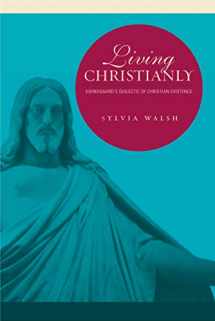
Living Christianly: Kierkegaard's Dialectic of Christian Existence
ISBN-13:
9780271026879
ISBN-10:
0271026871
Edition:
1
Author:
Sylvia Walsh
Publication date:
2005
Publisher:
Penn State University Press
Format:
Hardcover
216 pages
FREE US shipping
Book details
ISBN-13:
9780271026879
ISBN-10:
0271026871
Edition:
1
Author:
Sylvia Walsh
Publication date:
2005
Publisher:
Penn State University Press
Format:
Hardcover
216 pages
Summary
Living Christianly: Kierkegaard's Dialectic of Christian Existence (ISBN-13: 9780271026879 and ISBN-10: 0271026871), written by authors
Sylvia Walsh, was published by Penn State University Press in 2005.
With an overall rating of 4.2 stars, it's a notable title among other
books. You can easily purchase or rent Living Christianly: Kierkegaard's Dialectic of Christian Existence (Hardcover) from BooksRun,
along with many other new and used
books
and textbooks.
And, if you're looking to sell your copy, our current buyback offer is $0.3.
Description
The pseudonymous works Kierkegaard wrote during the period 1843–46 have been responsible for establishing his reputation as an important philosophical thinker, but for Kierkegaard himself, they were merely preparatory for what he saw as the primary task of his authorship: to elucidate the meaning of what it is to live as a Christian and thus to show his readers how they could become truly Christian. The more overtly religious and specifically Christian works Kierkegaard produced in the period 1847–51 were devoted to this task. In this book Sylvia Walsh focuses on the writings of this later period and locates the key to Kierkegaard’s understanding of Christianity in the “inverse dialectic” that is involved in “living Christianly.” In the book’s four main chapters, Walsh examines in detail how this inverse dialectic operates in the complementary relationship of the negative qualifications of Christian existence—sin, the possibility of offense, self-denial, and suffering—to the positive qualifications—faith, forgiveness, new life/love/hope, and joy and consolation. It was Kierkegaard’s aim, she argues, “to bring the negative qualifications, which he believed had been virtually eliminated in Christendom, once again into view, to provide them with conceptual clarity, and to show their essential relation to, and necessity in, securing a correct understanding and expression of the positive qualifications of Christian existence.”


We would LOVE it if you could help us and other readers by reviewing the book
Book review

Congratulations! We have received your book review.
{user}
{createdAt}
by {truncated_author}


